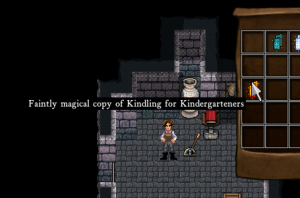Well, not all “they”s have stopped making games like they used to, but things have definitely changed.
Personally as a gamer, there are a lot of things about the way things are changing that I don’t like. Take the RPG for example: a medium which began with Gary Gygax giving the escapists of the world a way to be a beefy barbarian who gets the ladies in, back then, probably their parents basement with some junk food and no girls:

- Courtesy of Westworld Blogs
And sometime in the last 25 to 30 years, console and computer gaming has gone from being something that kids at school felt self-conscious about because they were uncool, to being an industry with yearly revenues to rival video television and music.
But we’re not all sitting around tables rolling dice and drinking mountain dew. The reasons? Creative direction, cost, profitability, and marketing.

I should say that I actually do play pen&paper RPGs. My group gets together once a week to play Pathfinder, a derivative of D&D 3.5.
The good reasons why we don’t play games like that anymore? Storytelling, for one. The technology available to a game developer these days allows us to decide from a vast array of possibilities exactly how the player should be capable of interacting with our worlds, and in doing so one can provide storytelling elements such as theme, setting, and style. Also, you couldn’t play D&D by yourself when it’s 3pm but all your friends are at work and you have the late shift.
Video game designers of the past were, in essence, all lobbying for that period of time that you don’t really know what to do with, because they couldn’t really compete for the time that you did know what you wanted to do with, be it D&D, drinking with friends at the pub, watching a movie, or whatever. Games just weren’t capable of delivering an experience rich enough to compete when all that was available was pong in 1972 or pac man in 1980. The evolution of our technology, allowing for more creative direction, has made games like World of Warcraft capable of solving this issue.
But there are other reasons why games have changed, and they’re not nearly as good for the consumer.
Producing a video game was once the same for everyone as it is for small startups today: you work in your spare time to produce something that you think people will like and hope you run out of things on your to-do list before you run out of time or energy or money.
That model has been seriously overshadowed by large companies which started out as the small ingenious companies above, but have grown as the market has grown into billion dollar corporations which collect terabytes of data on where people click, what people buy, and what makes people buy more: a finely honed machine on cutting under-utilized and over-wrought resources so that in the end the ROI will improve.
This is why Final Fantasy doesn’t have towns anymore. This is why Rock Band has 12 iterations that all cost 3 thousand dollars and the core game is exactly the same.
I’m sure there was a time, once, when someone was writing a video game like Oregon Trail and thought, “Man, won’t it be cool when we have the technology to make it possible to actually make all the decisions: how does one ford a river, for example, or what happens once you get to the Ozarks? These are the kinds of things that RPGs did way before video games were on the scene – and still do. You want to run a used mop store? D&D can do it, Pathfinder, Palladium, Rifts, Heavy Gear… they all can. But can I not kill Ares in God of War? Can we talk things out? Hell no, that would just be too expensive.
Now, this is RPGs I’m talking about here. If you could do anything in Bejeweled it would just be weird and confusing; there is a time and place for everything. But is video gaming doomed to this downward spiral of disappearing player-driven freedom? I hope not, and I honestly see no reason why it should. Occasionally, the indy game developers and small companies still make great products, not tied to their budgets like the big guys, and they can make towns and yogurt makers and whatever they want. And, with the right group of fans to support them (and remind them of why they like their games), they will keep making them.





